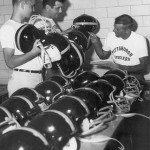Worship, Jesus Christ, and Gathering with the Church
Several years ago, when I was still in the middle of my MDiv studies at Southeastern, two books in particular were very influential on me. The books were not necessarily influential on my thoughts and understanding about God or the church. Instead, these two books and authors helped me realize that it was possible to present what I was learning about the church in an academic or scholarly manner.
Those two books were Paul’s Idea of Community by Robert Banks and Engaging with God: A Biblical Theology of Worship by David Peterson. I still count these two books among my favorites. Recently, I was reading through Peterson’s conclusion, and I found these two paragraphs:
The uniqueness and total adequacy of Christ’s work is obscured by any doctrine of human priesthood, charged with some form of sacrificial ministry in the Christian congregation. There are no special buildings where God is especially present in the gospel era. There is no divinely ordained ritual of approach to God for believers under the new covenant. Nevertheless, several texts suggest that God presences himself in a distinctive way in the Christian meeting through his word and the operation of his Spirit.
The purpose of Christian gatherings is the edification or building up of the body of Christ. We minister to one another as we teach and exhort one another on the basis of his word, using the gifts that the Spirit has given us, in the way that Scripture directs. Edification is to be our concern even when we sing or pray to God in the congregation. All this is not a purely human activity, however, for God is at work in the midst of his people as they minister in this way. Edification is first and foremost the responsibility of Christ as the ‘head’, but he achieves his purpose as the various members of the body are motivated and equipped by him to play their part. We meet together to draw on the resources of Christ and to take our part in the edification of his church.
There are several important aspects of these paragraphs. First, remember that Peterson included this in the conclusion of his book on the topic of worship. He covered the topic from both the Old Testament and the New Testament.
Second, in that context, we can see that “worshiping God” in the “gospel era” (as Peterson calls it) includes both our private response to God through Jesus Christ and our public response by building up the body of Christ.
Third, God has placed us among his children – our brothers and sisters – because he wants to use EACH ONE of us to build up (edify) his church. Every believer is necessary and important to the work that God is doing to build up the body of Christ.
Fourth, our particular role is NOT passive. While the primary work of edification belongs to Christ, he does his work THROUGH us. If we do not take our part (or “do our share” depending on the particular translation of Ephesians 4:16), then the church is not built up.
Fifth, this work of edification – the work that we do in the Spirit – is worship.
Let me repeat that… Edifying the church is worship.
Refusing to participate in the work of building up the church is the same as refusing to worship.
Inhibiting or preventing others from doing their part in edifying the church is the same as stopping others from worshiping and attempting to block the worship that God is due. (Yes, even unintentionally.)
This is an important topic. The church of God grows when ALL of God’s children take part in the work of edification… and that work is worship to God.
But are we maturing in Christ?
At the end of my previous post (“A spinning cog in the Rube Goldberg machinery“), I added a link to an article (on “Internet Monk”) about Shaun King called “Hooray for Shaun King!”
Now, if you are like me, you have never heard of Shaun King until you read that article, or another article about his recent decision. What decision is that?
Well, for the last three years, Shaun King has been the pastor of a hip, growing church in the Atlanta area. A few weeks ago, he resigned. Why? Well, this is what he said (as I quoted at the end of my previous article):
What I am saying is that church attendance, Sunday morning services, sermon-listening (or even sermon preaching), song-singing, hand-clapping, amen-saying and all of the things that “Christ-ians” have lifted up so high look so little like Christ himself that I am utterly convinced that we are completely off base with what discipleship means.
You can read this and more in Shaun’s post “3 Extremely Hard-Earned (Trust Me) Lessons on Starting Something New, Change, and Discipleship.”
Now, I know that some of my readers do not agree with Shaun about the value of “church attendance, Sunday morning services, sermon-listening (or even sermon preaching), song-singing, hand-clapping, amen-saying,” and other things that churches normally do and encourage. However, please don’t get lost in those details.
The main problem for Shaun was that they were not discipling people. People were not maturing in Jesus Christ. They were doing alot of things, but those things were not beneficial in helping one another follow Jesus.
(By the way, if I remember correctly, Willow Creek’s leadership came to a similar conclusion a few years ago.)
My last few posts have focused on this question: “Are we helping one another follow Jesus and mature in him?”
If we are, then great. If not, then are we willing to change? (You should definitely read Shaun’s post about, because he talks alot about willingness to change.)
Are you maturing in Christ? How can you tell? Are the people around you that you interact with maturing in Christ? How can you tell?
A spinning cog in the Rube Goldberg machinery
You’ve heard of a “Rube Goldberg Machine,” right? You know, one of those contraptions with complex wheels and slides and pulleys and levels and the occasional animal which is designed to carry out a simple function. (A good example is the 1960’s board game “Mouse Trap.”)
In a Rube Goldberg machine, each piece may be turning or sliding or rolling or falling and expending tremendous amounts of energy to do that work. But, in the big scheme of theme, the piece may be doing very little to accomplish the purpose of the machine.
It is possible (and perhaps probably in some cases) that our lives can be caught up being a spinning cog in a Rube Goldberg Machine, even as Christian among the church. It’s possible (and sometimes probable) that we are expending alot of energy doing alot of stuff but actually getting very little accomplished.
In fact, sometimes Christians are taught and encouraged that their purpose is in being that spinning cog.
By the way, don’t think that I’m only talking about large, institutional, or traditional churches. I’m not. The same thing can happen small, simple, or organic churches.
Anytime we forget our purpose as a follower of Jesus Christ and as a brother and sister to those around us, we can get caught up in activities and programs while actually doing little or nothing toward our purpose. Busy… working hard… even successfully… but at what?
Sometimes, the best thing we can do for the church (although not necessarily for the machine) is to stop spinning. Stop being a cog and start living out your purpose in Christ.
What is that purpose? Well, you may need to stop being a cog and start listening to God to figure that one out. But, I know that it would include abiding in Christ and discipling others. What that looks like and how that will happen, I can’t tell you. And, in fact, while others may help you hear what God is directing you to do, no one else can actually tell you what God is calling you to do either.
So, what is going to be? Continue being a spinning cog? Or stop spinning and start living in and demonstrating Christ’s love.
(By the way, after writing this, I saw this post called “Hooray for Shaun King!” Also, check the links at the bottom of that post. In one of them, Shaun makes the following statement:
What I am saying is that church attendance, Sunday morning services, sermon-listening (or even sermon preaching), song-singing, hand-clapping, amen-saying and all of the things that “Christ-ians” have lifted up so high look so little like Christ himself that I am utterly convinced that we are completely off base with what discipleship means.
Whether you agree with his conclusions or not – and I do – it is clear that Shaun is tired of being a cog in a Rube Goldberg Machine – even tired of being the head cog.)
Helping others follow Jesus
After Jesus was raised and just before he ascended into heaven, he told his followers, “Go therefore and make disciples of all nations, baptizing them in the name of the Father and of the Son and of the Holy Spirit, teaching them to observe all that I have commanded you.” (Matthew 18:19-20) This is the passage that is usually called “the Great Commission,” and something like it is included in each of the Gospels as well as the Book of Acts.
The idea of helping others to follow Jesus is also expressed in Scripture by terms like “edify,” “strengthen,” “encourage,” “imitate,” “grow,” and “mature.” I think we see this taking place especially in the “one anothers” that we find scattered throughout the pages of the New Testament.
When I talk with people about this concept, there is often a disconnect between recognizing this goal (of helping people follow Jesus) and actually helping them. In other words, we know that we should be helping people, but we don’t necessarily know HOW to help them.
So, would you be willing to help my readers with this? How do you help others follow Jesus? How has God used you in the lives of other people to help them be disciples of Jesus Christ and to grow in maturity in him?
(I would expect that there would be as many different answers as there are people reading and commenting on this post…)
When equippers don’t equip
Recently, I had a very interesting conversation with a friend on Ephesians 4 – specifically Ephesians 4:11-12 – “And he [Jesus Christ] gave the apostles, the prophets, the evangelists, the shepherds and teachers, to equip the saints for the work of ministry, for building up the body of Christ…” (Ephesians 4:11-12 ESV)
While I’ve written several posts about the list in Ephesians 4:11. For example, one of my most read posts of all time deals with whether Paul intended to list four or five different types of gifted individuals in the list. Also, I’ve written posts about whether this post in simply a sample of gifted individuals (like all of the other spiritual gift lists) or whether this list in exhaustive.
But, in this post, I want to focus on something else: the purpose of the spiritually gifted individuals listed in Ephesians 4:11. Paul tells us why Jesus Christ gives spiritual gifted individuals to the church in verse 12: “…to equip the saints for the work of ministry, for building up the body of Christ…” (Ephesians 4:12 ESV)
Thus, the work of the apostle, prophet, evangelist, and shepherd-teacher includes equipping (preparing) the church for works of service. While these gifted individuals will naturally work within their giftings, they are also supposed to equip the saints to carry out those same functions.
This is best seen in the spiritually gifted evangelist. From the name “evangelist,” it seems clear that this individually is somehow spiritually gifted to proclaim the gospel of Jesus Christ. But, evangelism is not “equipping the saints for the work of service.” The evangelist does not carry out this function until he or she is almost helping other believers to proclaim the gospel of Jesus Christ.
The evangelist, then, is not carrying out the evangelist’s function ONLY by sharing the gospel. Instead, the work of the evangelist includes teaching and showing others how to share the gospel.
Now, take this same idea into the realm of the apostle, prophet, and shepherd/teacher. Again, these individuals should function within the realm of their particular gifting (by being sent, prophesying, or caring/teaching), but their functions do not end there. They are also to help others understand and live as being sent, to help others listen to God and prophesy, and to help others care and teach.
An apostle who is always going but is never helping others to go is not doing the work of an apostle. A prophet who is always prophesying but is never helping others to prophesy is not doing the work of a prophet. An evangelist who is always sharing the gospel but is never helping others to share the gospel is not doing the work of an evangelist. A shepherd/teacher who is always caring/teaching but it never helping others care/teach is not doing the work of a shepherd/teacher.
The spiritually gifted individuals listed in Ephesians 4:11 are given to the church both to function within their own giftings AND to help others function within those giftings as well. (I would argue this is true for other spiritual gifts also.)
So, how can we tell if we are equipping others? Well, we could start by asking if we are always doing the work that we are gifted at doing, or are we showing others how and giving them opportunities to do the same work.
By the way, if we continue reading in this same passage, we see why it is so important for these individuals to equip the church to do works of service. In Ephesians 4:16, Paul says that the church grows only when the whole church is working together. The church does not grow when only those listed in Ephesians 4:11 are working.
It’s time for equippers to stop doing all the work and start equipping others to work. This means that at times the equippers needs to step out of the way so others can function as God has gifted and prepared them. (If we never feel others are ready, it’s because WE are not equipping them.)
I skipped Back to Church Sunday… or did I?
So, my family did not “go to church” Sunday morning… and, before you get all technical on me, we didn’t gather with the church Sunday morning either.
Now, I found out last Friday (I think), that yesterday (Sunday) was “Back to Church Sunday” when, apparently, I was supposed to invite someone to go to church with me. Of course, since we didn’t gather together with the church ourselves, we didn’t invite anyone either.
Or, did we gather with the church…
Friday night, at a high school soccer game, Margaret (my wife) and I had a great conversation with a friend about discipling others. She had been struggling with several questions about helping others grow in maturity and what her role should be in that. It was a encouraging and challenging conversation.
Saturday night, a couple had invited us to have dinner with them and their daughter. Margaret and I began discipling this couple just before their wedding. (Some would call this “marriage counseling”, but as we told our friends, we don’t do “marriage counseling”. Instead, we simply try to help people walk in Christ in whatever situation of life they find themselves.) We had such a great time with this family!
Sunday morning, we were tired and, to be honest, I was discouraged by some news I had received recently. So, we stayed home and rested as a family.
Sunday evening, we joined some of our brothers and sisters at a park for exercise and fellowship. Again, we had such a great time talking about life as we walked around the track.
So, we didn’t take part in “Back to Church Sunday” on Sunday morning… but I definitely think we gathered with the church last weekend.
Now, I wonder how we’ll gather with the church during this week…
Guest Blogger: Sunday Morning Sucker Punch
I’ve invited several people to write “guest blog posts” for this blog. There are several reasons for this: 1) To offer different perspectives. 2) To generate even more discussion and conversation between blogs. 3) To introduce other bloggers to my readers.
(If you are interested in writing a guest blog post, please contact me at aknox[at]sebts[dot]com.)
Today’s post was written by Blake Sorensen.
—————————————
SUNDAY MORNING SUCKER PUNCH
It was a Sunday morning like any other. Sunshine blazing down out of the hot summer sky. My wife in her favorite jeans. Her hair in a ponytail. My two girls in the back seat were playing pretend with their stuffed animals. None of us had any idea what was about to come.
Dropped off the girls in the Kid Zone. Grabbed a cup of the designer coffee in the foyer and split a chocolate donut with my wife as the worship band was winding down. We slipped into our favorite row of seats near the middle and the pastor stepped up to microphone. The thunder began to rumble.
He clears his throat. Makes a lame joke about the worship band. Then he drops the bomb.
“God is doing a new thing with our church,” he says. Another conference? No. It’s worse.
“Next Sunday our congregation will become part of Hope Christian Church,” he says. I stop sipping my coffee.
Apparently, there are things that our church “has always wanted to do” but didn’t. Or couldn’t for some reason. Now, somehow, we have a chance to “be the church we were always wanting to be” – by merging with some other church I’ve barely heard of before.
So, that’s it? Our church history, our identity, our vision, our relationships, are just gone? Over?
Yes. It’s over. No vote. No warning. Just, “Thanks for investing your lives here. Now you’re all joining this other Church where I will now be on staff as their Associate Pastor. See you next week at that other place. Maps are in your bulletin. We know you’re gonna love it.”
But I don’t. I don’t love it. I hate it. I really, really hate this.
What if I don’t want to join that other church? What if some of us here want to stay together and continue to fellowship without you, pastor? Can we do that? Is that even an option?
Not in America. See, church in America is largely a franchise. It’s a business. And like most businesses in America today, things are not looking so good. The economy is still in free fall. There are still millions of hard working Americans who are hardly working – and working hard to find a job to put food on the table.
Because of these factors, the Church business is suffering. Less people are going to church on Sunday – and not because of anything to do with the economy, but essentially because the Church has become known more for what she opposes (gay marriage, abortion, increased taxes), and less for what she is in favor of (love, forgiveness, grace).
So, because less people are coming to the Church performance every Sunday morning, the offering plates are beginning to get lighter. This means it’s harder than ever to make payroll. Lesser pastors and staff get the boot first. Eventually, the church is left with just a lone senior pastor, a handful of unpaid volunteers, and a big, empty building which needs to be paid for. Of course, utilities, maintenance, security – these things cost money, and if your Church business isn’t bringing in the people, you’re probably not going to make your bill payments regularly.
What’s a business to do? Merge!
Now, any good business major will tell you that, in a merger, there’s a winner and a loser. One business loses all its identity as it becomes absorbed into the larger business. It’s how things work.
That same business major will also tell you that anytime a merger takes place it’s because both businesses are in financial stress. The larger business needs to quickly and artificially stimulate their talent pool and raise inventory. The weaker business needs someone to rescue them because they’re in over their heads and they need someone bigger and smarter to take the wheel.
Apparently our church was one of the weaker ones. We lost our identity. Like it or not, our church is dead and we must now warm the seats over at Hope Christian Church. At least until they end up merging with First Baptist down the street a few years from now.
I’ve started to notice lately that a lot of local churches have decided to merge with other churches to stay in business. A co-worker’s church is merging with another church too. At least his church is keeping their name, and their senior pastor. They’re even getting a new building out of the deal. No more leasing for them.
You know what really irks me, though? It’s that this business decision is twisted around as some kind of Divine revelation. My friend’s pastor told everyone that “God is leading us to join with this ‘Other Church’ because together we can do so much more!” Which is, of course, a flat out lie. The actual truth is that these pastors would never in a million years consider merging with another church if their bank accounts were bursting. No, the main reason these churches would ever even consider a merger in the first place is because the only other choice is to close their doors and go out of business.
What truly angers me most is how these pastors spin the story to their congregations. This is pure, unapologetic salesmanship, plain and simple. When they say to their flock, “God revealed to us that our two churches needed to come together to accomplish something wonderful in this city!” What they really mean is, “I was praying about whether to leave to find another, larger church to hire me, and then I met this other pastor who said he would not only hire me, but he’d love to take our dwindling members and double the size of his church overnight!”
The spin is: “This is a sudden, miraculous move of God!” and the truth is: “This is the only way I could keep my job!” and it frankly makes me a little sick.
I mean, aren’t pastors supposed to put the needs of the sheep over their own? Would it have been the end of the world for our pastor to get another job like the rest of us? Couldn’t he serve here as a volunteer? Are we only a real Church if he’s getting paid to preach every week?
I write this article out of frustration, and also out of sincere disgust. It really saddens me to see pastors more concerned for their paycheck than they are for the people at their church. So, when your pastor stands up on Sunday morning and without warning spins a story that essentially boils down to this: “The church you love is shutting down. You will now need to start attending this other church you never heard of before where I will now be on staff,” you’ll know that it was a great idea for your pastor and an “ok” idea for everyone else.
Maybe that’s how traditional churches will eventually disappear? One by one they will all be forced to merge together as they shrink down smaller and smaller. Eventually all the traditional churches in your town will be just one big church made up of former Lutherans, Presbyterians, Methodists, Charismatics, Baptists, and Non-denominational church members.
Actually, that sounds like a wonderful church, doesn’t it?
Maybe this really is a blessing in disguise?
-Blake Sorenson
Scripture… As We Live It #174
This is the 174th passage in “Scripture… As We Live It.”
As each has received a your leaders acknowledge and recognize your gift, use it to serve one another the members of your local church organization, as good stewards of God’s varied grace: whoever the leader speaks, as one who speaks oracles of God; whoever everyone else serves, as one who serves by the strength that God supplies within the programs of your local church organization — in order that in everything God may be glorified through Jesus Christ. (1 Peter 4:10-11 re-mix)
(Please read the first post for an explanation of this series.)
Replay: Imagine all the people… loving one another in spite of their differences
Four and a half years ago, I wrote a post called “Imagine all the people.” No, the post had nothing to do with John Lennon’s famous song. Instead, the post was in response to studying Paul’s letter of Ephesians with my family. The question we pondered that evening – that resulted in this blog post – is this: how do we love people who are different from us. We found something in Paul’s letter to the believers in Ephesus that helped us. Perhaps it will help you too.
——————————————
My family is studying Ephesians. Now, I know that some of you who know me well are laughing, because I LOVE to study Ephesians – it seems that I am ALWAYS studying Ephesians. Anyway, this is actually for a class assignment for which I have recruited my family to help.
We are supposed to read through Ephesians (and 1 Peter later) and answer the following question: “What do these texts say about faith as a way of life?”
As we were reading through chapter 2 of Ephesians, we noticed the emphasis on how God had created one new people from the Jews and Gentiles (Eph 2:14-16). This new people was to live as a family (household) and citizens of a new kingdom (Eph 2:19). Again, in chapter 3, Paul says that when Jews and Gentiles lives as one people (the church) they demonstrate the manifold wisdom of God (Eph 3:10). Paul also reminds us again that we are one family named for God, such that God is the patriarch of the family (Eph 3:14-15). He then calls us to strength, knowledge, and love (Eph 3:16-19).
We discussed how difficult it is for us to live with and love people who are different from us. Certainly the Jews and Gentiles found this kind of life difficult. Yet, God expects us to live as a family and to love one another – and not just any family, but His family – and not just with people who are like us, but with all believers, even if they are very different from us. How do we do that?
So, we did a quick exercise that really helped me, and hopefully it helped them. Maybe it will help you as well. Here is the exercise: Think of someone who is completely different from you. Think about their race, ethnicity, education level, economic level, hygiene, clothing, housing, language, culture, etc. Picture that person in your mind, and ask yourself, “How can I possibly love that person and live together as family with that person.” Then, read the end of Ephesians 3 below:
Now to him who is able to do far more abundantly than all that we ask or think, according to the power at work within us, to him be glory in the church and in Christ Jesus throughout all generations, forever and ever. Amen. (Ephesians 3:20-21 ESV)
Certainly this passage applies to more than our living together in love with those who are different from us. But, it does apply to this as well. Because of God’s power at work in us, He is able to love someone through us that we would never love on our own.
Comment highlight: Hindering the church from being a greater witness to the world?
I want to highlight (what I think is) an awesome comment left by Scott on my post “The exclusivity of the modern local church.”
In that post, I had argued that the modern concept of “local church” tends to separate Christians from one another, such that we see each other as ekklesia (“church”) only when gathered within the context of that “local church” (but not a subset or with another group).
At the end of the post, I asked two questions. I’m not going to repeat them here, but Scott includes the questions in his comment.
Here is Scott’s comment:
Alan, you asked:
1. Do you agree or disagree with what I’ve written here?
Yes, I absolutely agree. The evidence in scripture for this kind of exclusivity is scant to non-existent. And if we think of the Christian faith in terms of a movement (which I think it is and was then) rather than an institution then this makes sense. Also, Jesus (in contrast to the religious leaders of his day) seems more inclusive than exclusive to me.
2. Regardless of whether you agree or disagree, what would happen to the church (ekklesia) if we treated the assembly (“church”) as less exclusive, as I’ve talked about here?
I think a beautiful thing would happen. The church would have a greater witness to the world! But as long as we have expensive buildings and salaried pastors (I am one so this is not stone throwing) it is likely to be impossible.
There is a reason for the exclusivity you describe. It is inherent to our practice of “church.” Our practice of church today creates a competitive and protective mindset that just can’t be ignored. We have too many obligations (debt, salaries, programs, membership rolls, etc) to provide for. There is a motive behind keeping it exclusive. It’s not right and I hate this (I struggle with it all the time), but it’s the way things are.
absolutely agree
What do you think? Is the exclusivity of the modern “local church” inherent in our practice of church today? Does our modern understanding of church create a competitive and protective mindset? How do we help one another move away from that, or should we?










